
Transcription
A DEACONA DEACONON ONPURPOSEPURPOSEFOUR BIBLICALBIBLICAL ESSENTIALSFOURESSENTIALSDR. TONY WOLFEWWW.TONYWOLFE.NETDR. TONY WOLFEFOREWORD BY DR. JIMMY DRAPER
Unless otherwise noted all Scripture quotations are takenfrom the Christian Standard Bible (CSB).
FIVE WAYS TOUSE THIS RESOURCE:1. Have deacons read one chapter (“session”) every month. Set asidethe first fifteen minutes of the monthly deacons’ meeting, for sixmonths, to discuss what they have read. Ask, “What stuck out to youin this session?” then employ the Questions for Discussion at the endof every session as a guide.2. Hold a deacon’s retreat or a deacon’s conference in which you take3-4 hours to work through the six sessions. Perhaps this is packed intoone evening, or perhaps it is stretched out over two days.3. Use the book as an introductory preparation resource for incomingdeacons.4. Repeat the training with the whole deacon body every 2-3 years asa refresher course and to discuss new issues and opportunities thatmay have arisen, surrounding the four biblical purposes of a deacon.5. Consider visiting www.sbtexas.com (or email twolfe@sbtexas.com)for six free 7-10 minute videos corresponding to the six sessions. Usethese as discussion starters or as introductions to each session.If you are holding this book, I have prayed for you. I have prayedthat God would multiply His grace to you as you work through thesepages, and as you serve the church so faithfully. Thank you for yourpartnership in the Gospel. Thank you for loving and serving The Bride.Sincerely Yours in Christ Jesus,Tony
FOREWORDBY DR. JIMMY DRAPEREveryone knows who a deacon is. Most people, includingthe deacon himself, may not know what he is! To definewhat it means to be a deacon requires looking no furtherthan the Greek word that is translated “deacon” in the NewTestament. The word itself tells us what a deacon is. He is a “servant”,one willing to do whatever is necessary to advance the cause of Christ,the witness and unity of the church. The word itself does not speak ofpersonal authority or personal recognition. It describes a person whoselife is totally committed to the Lord Jesus Christ and His church. He isa person who stands tall to set the example for what a genuine believershould be. He is loyal to the Lord, to the church and to his pastor andstaff. He is the indispensable ingredient in keeping a church movingforward toward the high purpose for which our Lord established thechurch. He is the man who always stands with the pastor, determined toprotect the pastor’s time so he can truly hear from God and always have aword from God when he stands to preach. He is the guardian of the unityof the church. He is the spearhead of the mission of the church. Withouthis loyalty and sterling integrity standing prominently for God to alwaysbe glorified and praised through the church, the church will likelyflounder in its focus on our great, creative, redemptive God.1
Sounds like he is indispensable to the church and to the pastor & staff,doesn’t it? Truthfully he is! The deacons arose out of the need to protectthe time of the Apostles from needed and important things that hadbecome an increasing burden to the Apostles. The enemy of the best isnot the worst, but the good. Good and needed things can absorb theenergies and passion of God’s undershepherds. That happened to theearly church. The deacons were called into being in the early church forthe purpose of freeing up the Apostles to spend more time in prayerand in hearing from God so they could proclaim God’s truth to thechurch. The same need is present today. A thousand important thingscan overwhelm the pastor so that he does not have the energy or timeto truly hear from God. The deacon was God’s provision to be a friend,counselor, support and encourager to the pastor. In that role, he standsto serve in any needed way to strengthen the ability of the pastor tospend more time in prayer and study to always declare God’s Word withclarity and application.I thank God as I look back over my decades of ministry for thedeacons God brought into my life. They fulfilled in every way thedescription Tony Wolfe has given of deacons on purpose. These pagesare not rocket science, just simple explanations of the biblical role of thedeacon as the one who frees up the pastor to fulfill his ministry that Godhas given to him. Read them with great benefit. Apply these principleswith great blessing!2
TABLE OF CONTENTSSESSION I: Introduction4SESSION 2: Lead By Example10SESSION 3: Serve the People19SESSION 4: Support the Pastor & Staff28SESSION 5: Protect the Peace36SESSION 6: Character and Purpose44AFTERWORD523
SESSION 1INTRODUCTIONYour whole life God has been molding you and shapingyou. He has for His grand design the image of His SonJesus Christ (2 Corinthians 3:18). Admittedly, we are allso far from that finished product. But we’re progressingtoward it. You were lost and dead in sin but God redeemed you throughrepentance and faith in Jesus. He deposited His Holy Spirit within you,and set your feet on the path of wisdom—a road that will one day endin your own glory, when you step out of this sin-scarred world and intoyour eternal home in Heaven. But He’s still molding you and shapingyou now. Like a Potter, modeling His clay. He is making you into theman He has called and newly-created you to be.And look at you now. Would you have thought—ten years ago,twenty years ago—that God would have called you to be a deacon inHis church? A servant-leader in His vehicle for worldwide Gospel4
propagation? “Unworthy” is the only word that comes to my mind whenI think about God’s call on my life, to an official position of service inHis church. But praise God, He has made me worthy through His sonJesus. And it is now my goal to “serve well” for God’s glory and for thestrengthening of my own faith (1 Timothy 3:13).Your local church family has seen within you the qualities they desirein a deacon. They have called you to serve them. To love them. To leadthem. They have ordained you to this purpose. It is a high calling: onethat thrusts you underneath the weight of other congregants’ first-worldproblems, lifting them up and encouraging them in their walk of faith.God has called. The church has approved. You have answered.So you’re a deacon. Now what?That thought has passed through my mind every time I’ve takenpart in a deacon ordination service. Most churches have outlinedspecific, biblical qualifications for prospective deacons. Most have awell-defined process for their selection. Most have general guidelinesand expectations for deacon service after they are installed. But whenit comes to actually serving as a deacon, many churches do not havean intentional plan to train incoming deacons, or to refresh deacons intheir purpose as the years pass. This study is designed with that need inmind.Perhaps you will use this as a training tool for incoming deacons.Or perhaps you will use it as a refresher course for deacons who haveserved for decades. In either scenario A Deacon on Purpose will call thedeacon body back to a biblical framework for service in the church.There are many excellent structural approaches to organizing thefunctions of the deacon body. Different structures and strategies mayfit various churches well, according to the specific needs of the churchor the specific giftedness of the deacons. Your church may employ adeacon-family ministry model, a ministry-team leadership model,a shepherding-group model, or any number of other strategies as astructural approach to getting the necessary work done.This study is not about structures and strategies. Rather, the goalherein is overall purpose. There are four biblical purposes to deacon5
ministry in the church. Whatever strategy or structure your deaconbody utilizes, it must in some way address these four biblical purposes.Each of the four purposes is explained, illustrated, and practicallyapplied in the subsequent chapters. At the end of each chapter, you willfind questions for group reflection and discussion.I encourage you to use A Deacon on Purpose as a guide to equip yourdeacons toward their four biblical purposes in the church. Repeat thistraining systematically—when new deacons begin their service to yourchurch, and every few years as a way of drawing existing deacons backto their purpose.Be intentional about this. The church functions well when it is led welland served well. It is my prayer that this will be a tool in your church’shands toward servant-hearted leadership within your deacon body andthat the Gospel of Jesus Christ will be advanced because of it.Our case study for the four biblical purposes of deacon ministryis Acts 6:1-7. Although these seven men may not have been called“deacons” per se, I believe the passage demonstrates the beginning of thedeacon ministry in the local New Testament Church. You will read andreflect on it often as you work through A Deacon On Purpose. But let’sstart with the end. Verse seven reveals what happened at the church as adirect result of these seven men serving well:“So the word of God spread, the disciples in Jerusalemincreased greatly in number, and a large group of priestsbecame obedient to the faith.” (Acts 6:7)That’s the whole point. When deacons serve the church well—onpurpose—the gospel is advanced, the Great Commission is fulfilled, andpeople grow deeper into their faith in Jesus. The significance of a biblicaldeacon ministry cannot be overstated. You are called with a high calling.Serve well and you will advance the cause of Christ; serve halfheartedlyand you will hinder it. Your time is too short and your mission tooimportant to be a deacon on accident. So be a deacon on purpose.6
Questions for Group Reflection/Discussion1. Reflect on (share) your story. How did you come to faith in Christ?How did you know He was calling you to be a deacon? What is Goddoing in your life today, as He continues to shape and mold you into theimage of His Son?2. Read 1 Timothy 3:8-13. What are some of the qualifications listed,and why are these important to the role of a deacon in the church?3. Take some time to work through your church’s structure foraccomplishing the functions of the deacon body. If there is no existingstructure or strategy, begin to discuss how you might implement one.7
NOTES8
ACTS 6:1-7“In those days, as the disciples were increasingin number, there arose a complaint by the Hellenistic Jewsagainst the Hebraic Jews that their widows were beingoverlooked in the daily distribution. The Twelve summonedthe whole company of the disciples and said, ‘It would notbe right for us to give up preaching the word of God to waiton tables. Brothers and sisters, select from among youseven men of good reputation, full of the Spirit and wisdom,whom we can appoint to this duty. But we will devoteourselves to prayer and to the ministry of the word.’This proposal pleased the whole company.So they chose Stephen, a man full of faith and the HolySpirit, and Philip, Prochorus, Nicanor, Timon, Parmenas,and Nicolaus, a convert from Antioch. They had themstand before the apostles, who prayed and laid theirhands on them. So the word of God spread, the disciples inJerusalem increased greatly in number, and a large groupof priests became obedient to the faith.”9
SESSION 2LEAD BY EXAMPLEIn our case study passage (Acts 6:1-7), the verb used in verse 2to describe the expected duty of the men selected is the worddiakoneo. It is the same word from which we have derived ourEnglish word “deacon”. The word for “deacon” literally means,in both form and function, servant; the office of Deacon in the NewTestament Church has always been one of service (see Chapter 2).However, service in the church has never been restricted to those whohold the title of deacon.The Bible instructs all members of the Body of Christ to serve oneanother. Consider Peter’s instructions in 1 Peter 4:10: “Just as each onehas received a gift, use it to serve others, as good stewards of the variedgrace of God,” (see also 2 Cor. 8:19, 2 Ti. 1:18, Phm. 1:13, Heb. 6:10).It is the calling of every New Testament believer to serve others in thechurch body with the giftedness God has afforded him/her.10
But the deacon has been called beyond this general instruction to anofficial position of service within the church. All are called to do theaction of serving. But the deacon is called to a biblical office so that hemight lead by example in this Christian service. He is expected to be aservant-leader, as a good steward of the “varied grace of God.”When the members of your church look at you, deacon, theyshould see the model servant. They should see someone leading not byextortion, but by example. Thus, the first biblical purpose of the deaconis to be an exemplary leader.My memory of him is so vivid. To this day, thirty years later, Icould describe to you the curvatures of his face, the wrinkles onthe backs of his hands, and the way his eyes lit up when he talkedabout the church. His name was “Bro. Kendall.” A deacon in myDad’s church. I cannot remember many times I was at churchwhen he was not. He was always present. Always working. Alwayssupportive. Always encouraging.He took a rotation on the bus route. And when it was not histurn to drive, he always had boxes of donuts waiting for us kidswhen they arrived. He mowed grass, painted walls, fixed coffee, andtaught Sunday School. He helped with RA’s and came every dayof Summer Vacation Bible School. I remember shaking his warm,firm hands and receiving that infectious smile of his approval—notapproval of what I had done, just approval of who I was.Bro. Kendall prayed the most eloquent prayers. His feet glidedacross the floor when he served the Lord’s Supper, almost as ifthey did not touch the floor at all. He was a man of integrity. Andcharacter. And grace.One day during my Dad’s sermon, Bro. Kendall drew his lastbreath and quietly slipped away into Heaven with Jesus. I admit, Iwas a bit freaked out about it when I was a kid. But knowing whatI know now about his love for God and for his church, there isno more fitting way for him to have died. I wanted to be like him.Thirty years later, I still do.By nature of the office, deacons have both positional and relational11
influence in the church. Of course, positional influence is the leasteffective of the two, but it is still inherent to the office, to a degree.However, relational influence is a great motivator toward positivecongregational movement. And because you are a deacon, you havethe ability to build relationships with the people in your church (at aminimum, the ones under your direct care or ministry assignment), andto influence them by your personal example.Want to know a secret? You are always influencing people. Especiallyas someone with a “title” in the church, you don’t get away fromexerting influence. By your action or inaction, your speech or silence,your involvement or absence, you are always influencing the people inyour church. The question is not “Will I influence?” Only, “Who?” and“How?” As a deacon, here are four areas of church life in which youmust lead by personal example.AttendancePeople need to be present at church activities in order to be a part ofthe body-life of the church. Perhaps that’s what frustrated the writerof Hebrews as he explained the importance of corporate worship,encouragement, and accountability (Hebrews 10:24-25). When believersare disconnected from the church body, they fall away easily. And it isoften difficult to jump back into a moving stream from which you havebeen removed for a while.Your church has a regular schedule of activities for a reason.Obviously, it is impossible for every single person to make every singleworship service or church gathering. Butabsence should be the exception, not the rule.WHEN A CHURCHWhen someone is regularly present, his orMEMBERIS OFTENher absence is felt. When regularly absent, hisPHYSICALLY ABSENTor her presence is awkward.FROMTHE BODY LIFE,Announcements, vision-orientedHE IS AT RISK OFstatements, carefully crafted sermonBEING SPIRITUALLYseries, and other church-specific thoughtsAND RELATIONALLYare communicated weekly in scheduledABSENT FROM THEgatherings. When a church member is oftenBODY LIFE AS WELL.physically absent from the body life, he is at12
risk of being spiritually and relationally absent from the body life as well.But you know that. You are spiritually mature—or at least, maturing.You know all too well that there are members of your congregation whoconstantly walk the line of being committed and being unengaged. Itis most likely part of your weekly or monthly assignment to reach outand connect with these wandering sheep trying to gently bring themback into the fold. You know that God has big plans for them in Hischurch. That He has gifted them uniquely through the work of the HolySpirit, and that your church stands in desperate need of them to use thatgiftedness for its edification and for His glory. You know these things.So what are you communicating to your church members by yourattendance habits? How does your regular presence, or regular absence,influence the line-walkers in your church body? Every week there area million things vying for their time and devotion: children’s sportsleagues, major professional ballgames, dirty houses, hunting season,warm beds after long sleepless nights, beautiful sunshine, pouring rain.Every week, the people you lead battle the temptation to be somewhereelse, rather than in church.Do they see in you a model of faithful attendance? You contend withall the same potential distractions they do. But are you committed tothe body-life, like they should be committed to the body-life? Just yourregular attendance, or regular absence, leads people by way of positionaland relational influence. I promise you this: if there are deacons in yourdeacon body who do not commit to the body-life of the church, you willbegin to observe a spiraling, unmanageable sense of detachment amongthe people in your pews.Honestly, your commitment to regularly scheduled church activities isjust a beginning. This is a minimum. It’s the lowest level of commitmentyou can possibly have, as a leader in your church. Let’s dive into somedeeper waters of leadership by example.Ministry InvolvementDo you serve on any ministry teams? Are you active in the missionprojects of your church? Do people in your church regularly see youserving as a faithful volunteer? If you don’t, they won’t. Leading thechurch from the deacon chair is a matter of modeling good church13
membership. The things your pastor and staff want your churchmembers to be doing. you should be consistently modeling.It takes every member for the church to be effective in its mission.Consider Paul’s words to the church in Ephesus: “From him [(Christ)]the whole body, fitted and knit together by every supporting ligament,promotes the growth of the body for building up itself in love by theproper working of each individual part,” (Ephesians 4:16). When theparts of the body (members of the church) do not serve the mission ofthe church using the giftedness God has afforded them, the church bodyis not being built up. It becomes stagnant at best, and dying at worst.But why would church members give their precious time and energy toinvest in something when church leaders do not?You do not need to be involved in every ministry area. But you doneed to find a lane and run in it. You can encourage church membersto get plugged in and to serve Christ’s mission until you are blue in theface. But if you don’t, they won’t.Tithing & GivingAs a deacon, you are to model good stewardship of the resources Godhas afforded you. Your pastor appreciates your time and service, but let’s getreal. it costs money to run electricity, fund ministry areas, plan activities,pay salaries, promote visions, and operate with excellence. Too manydeacons are simply bought-in to God’s kingdom work in and through theirlocal church. What we need is not for you to be bought in, but sold-out.Your pastor may or may not see the tithe as a biblical instruction. ButI bet he has some kind of a vision for how he expects church membersto steward their financial resources sacrificially and cheerfully. Butwhy would church members give sacrificially and cheerfully to God’skingdom work in and through their local church if their leaders do not?I am not advocating any kind of public disclosure of your giving.Your giving is between you and God alone. There should be nobragging, publication, or announcement of the deacon’s giving habits.However, when tested against your pastor’s expectations for churchmembers, you, deacon, should have been exceeding the mark.Giving to God’s kingdom work through your local church is a greatblessing. The ability to give is, itself, God’s gift to you. He is the One who14
“provides seed for the sower and bread forfood,” and it is He who “will also provide andGENEROUS GIVING TOmultiply your seed and increase the harvestYOUR LOCAL CHURCHof your righteousness” (2 Corinthians 9:10). ItPRODUCES A SINGULARis amazing how generous giving to your localDEVOTION TO GOD’SKINGDOM WORK.church produces a singular devotion to God’skingdom work. It is also amazing how, nomatter where you keep it, your pocketbook isalways in such close proximity to your heart.Deacon, give freely. Give lavishly. Give cheerfully. And in so-doing,lead by example.Attitude (On and Off the Court)Recently I watched an interview with a college basketball coach whowas answering a question about the kinds of kids he recruited to be onhis team. He explained that there are many talented kids in the gamethese days and deciding who to recruit is always difficult. For thatreason, one of the very first things this coach evaluates is not the player’sskill, but his attitude. He watches how the player acts toward officials,teammates, and the opposing team. But get this: the recruiting coach isnot just watching the player while he is in gameplay—he’s watching himwhile he’s on the bench as well!If the player has a bad attitude either on or off the court, this collegecoach says, “I don’t want him.” The player needs to be respectfuland coachable while in the game. He also needs to be respectful andsupportive of his team while on the bench. If he can’t run the court witha good attitude, and if he can’t sit the bench with a good attitude, theplayer will be a disease on the team, not an asset. He may be incrediblytalented. He may have a natural giftedness in the game. But players’attitudes are contagious. And this coach doesn’t want a negative attitudeaffecting the other players on his team.Deacons need to have a positive, encouraging attitude both on and offthe court. Your may be amazed at how your attitude can be contagious.Keep a level head. Refuse to show negativity about your church’sdirection or its leadership, whether publically or privately. The ApostlePaul instructed us toward this kind of Christian mindset: “Finally15
brothers and sisters, whatever is true, whatever is honorable, whatever isjust, whatever is pure, whatever is lovely, whatever is commendable—ifthere is any moral excellence and if there is anything praiseworthy—dwell on these things,” (Philippians 4:8).One of the most difficult things to get through, as a church, is anegative image within the body or in the community. Every negativeword feeds a negative image. So focus on, speak about, and encourageothers in what is praiseworthy. I bet if you really look at how God isworking in your church, there is so much for which to be thankful andgrateful. Promote those things. Talk about them. And watch how yourpositive attitude, on and off the court, will begin to change both yourheart and the hearts of the church members you lead by example.ConclusionWhen my children were young, I would often look behind me andsee them tracing my steps. Awkwardly, sometimes, trying to mimicmy stride or wear my facial expressions. It was so cute. Now that theyare teenagers, I realize that they are still watching me. Always. There isnot a moment that goes by during which I am not influencing them—whether by action, word, or attitude. I pray daily that if they walk mywalk, it will lead them to know God more fully and love Him moredeeply.Deacon, you lead by example. People are watching you. Always.You are always influencing the people of your congregation, whetheryou want to be or not. And your leadership will set the pace for theirspiritual walk.What kind of pace are you modeling for them? Where will your stridelead them? If you ever wonder whether you are influencing positivelyor negatively through your leadership in the church, just look to thefaces and voices of those who surround you. Their actions, words, andattitudes will tell the story of your leadership example. Good, bad, orugly, over time you will most likely see yourself in them.16
Questions for Group Reflection/Discussion1. Are the people in your church body good at serving one another? Ifnot, do you think that may be a reflection how the deacon body leads byexample in this area of church life?2. In your own words, how is relational influence more powerful thatpositional influence?3. Can you think of a deacon who influenced you positively at somepoint in the past?4. Think through the four areas of leading by example mentioned in thischapter. How have you personally seen these played out in your ownministry—whether positively or negatively?5. Be honest. Which of the four areas of leading by example do you needto work on the most right now?17
NOTES18
SESSION 3SERVE THE PEOPLEAt the beginning of Session 2, we explored the actionverb diakoneo, in Acts 6:2. In that context, the Apostlesliterally tell the people that they need to focus on thework of preaching and leading instead of having to“wait on tables.” A widow’s ministry had been started in the church.They provided daily staples for both the Hebrew widows and the Greekwidows in the fellowship. But as the church grew in numbers, the taskbecame too cumbersome and too time-consuming for the Apostlesthemselves to manage well. So the makings of a New Testament deaconbody were born in the context of, quite literally, table-waiting.I cannot emphasize enough the importance of this truth. The deaconministry was born out of the need for service. These seven men were notchosen as a deacon board, making decisions for other people to follow.They were chosen to be men who were strong in the faith and werewilling to roll up their sleeves, put their feet to the floor, and serve the19
people of the church body. The second purpose ofYOU CANNOT BEthe New Testament deacon is good old fashioned,A DEACON ONtable-waiting service. You cannot be a deacon onPURPOSEIF YOUpurpose if you cannot or will not selflessly serveCANNOT OR WILLthe people.NOT SELFLESSLYThere are a number of practical ways that you,SERVE THEas a deacon, can serve the membership. SomePEOPLE.of them can be systematized. Others must bespontaneous. But however they are accomplished,these things are non-negotiables for the Deacon on Purpose. Here arefive areas of service that are essential to your supportive role as a deacon.VisitationThere is no way that your pastor and staff can make an appearance atevery hospital, nursing home, home-bound need, milestone celebration,wedding, funeral, sports game, and widow’s home and still be able tolead the church well. You, deacon, are an extension of his ministry.Your deacon body is the long arm of the pastor’s sympathy, celebration,encouragement, and love to the members of your church.Often, deacons have scheduled visitation practices that are part ofa systematic plan to ensure each member of the church is visited inhis or her time of need. But most of the time, visitation needs pop upunexpectedly. Be an extension of your pastor’s ministry by showing upat a hospital visit, or cheering on your church’s youth or children (byname) at a sporting event. If you get a chance, brag on your pastor whileyou’re there. Give them his greeting, and assure them of his love.As a pastor, it was such a joy to show up at a hospital and learn thatone or two of my deacons had already been by to visit. Or to get that callfrom one of my deacons to say, “So-and-so has had a rough week in thenursing home. There’s no reason for you to go; I saw her yesterday andplan to go back tomorrow. I just wanted to keep you informed.”Offer to get first-time guests’ information and make a home visit. Callyour pastor and say, “I’m headed to town; is there anyone I can stop bythe hospital and visit for you?” This service to your church membershipis also a service to your pastor. Be an extension of his ministry. Servepeople by visiting them.20
Monthly “Touches”Where I have served as a pastor, our deacons have been given printedlists of families from our membership with whom they are responsiblefor staying connected. As the church grows, it becomes more and moredifficult for your church staff to keep up with everyone. If the onlytime someone is engaged is when they walk through the church doors,meaningful relationships are impossible to build.One Sunday morning I noticed a church member present who I hadnot seen at church in a very long time. I approached her after the serviceand said, “Mrs. Smith, I am so glad to see you today. I’ve been missingyou.” Her reply brought a smile to my face for reasons she probablywill never know: “Thank you, Pastor. Bro. Jones has been keeping upwith me. calls me about once a week. He came and picked me up thismorning. It’s so good to be able to be back with my church family.”I was pleasantly surprised to know that one of my deacons had beenkeeping up with this woman for months. I was disconnected from herpersonally. But because this deacon was intentional about his weekly“touches,” she was not disconnected from her church family.By “touches” I mean texts, ph
deacons toward their four biblical purposes in the church. Repeat this training systematically—when new deacons begin their service to your church, and every few years as a way of drawing existing deacons back to their purpose. Be intentional about this. The church
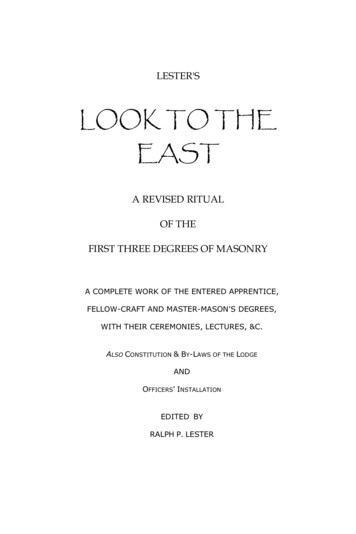
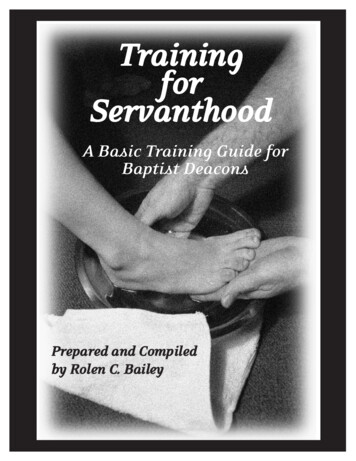

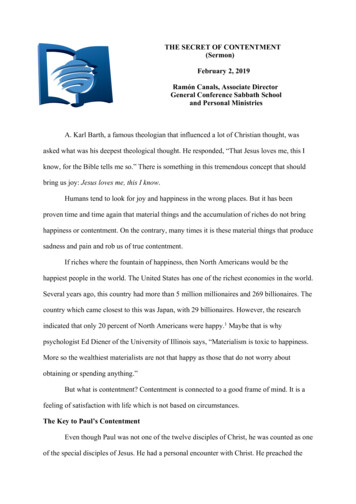


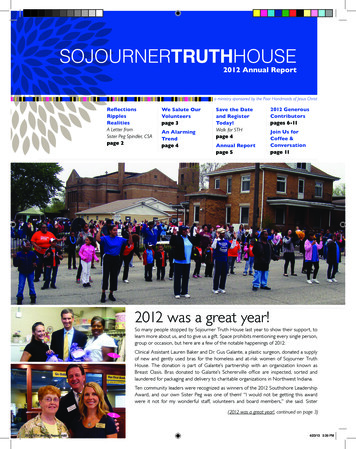


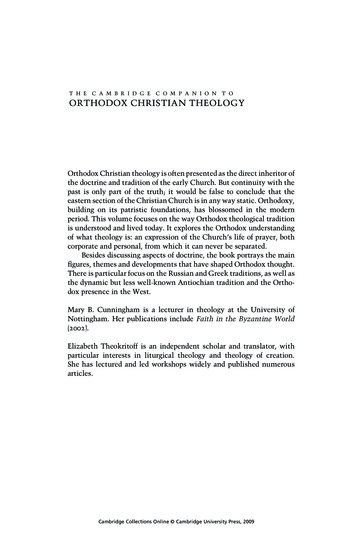
![Prayer of the Faithful 2022 [eBook]](/img/18/30146865.jpg)